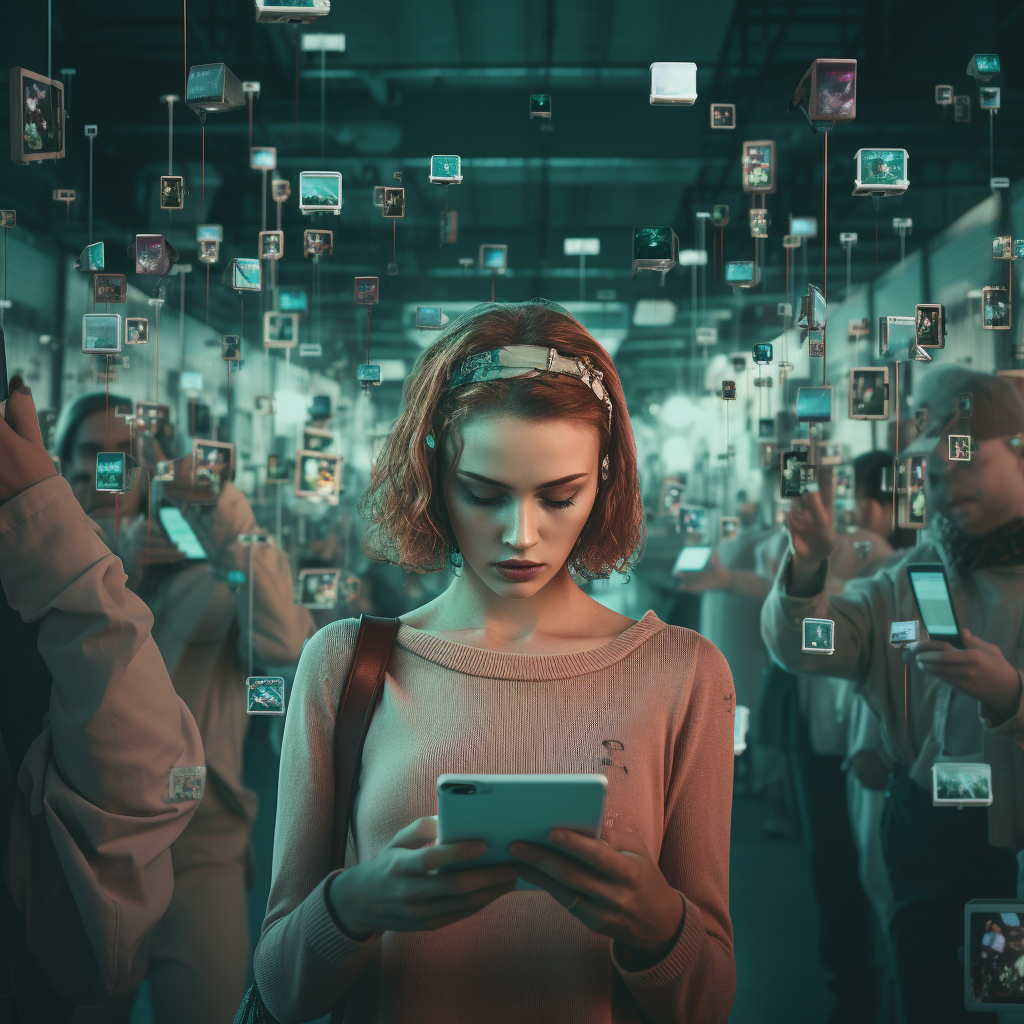Reading Time: 11 minutes

The Synergy of AI and Social Media – Shaping the Digital Tomorrow
In the ever-evolving digital cosmos, a remarkable synergy is unfolding: the dynamic fusion of Artificial Intelligence (AI) and social media. This integration isn’t just altering how we interact online; it’s redefining the very fabric of digital communication and marketing. As we stand at this technological crossroads, it’s crucial to explore how this alliance is shaping our present and paving the way for an AI-infused future.
At the core of this revolution lies the art of crafting AI-driven social media posts. These sophisticated algorithms are not merely tools; they’re the artisans of the digital age, sculpting content with precision and insight far beyond traditional methods. This AI-driven approach to content creation is transforming how messages are conveyed, ensuring they resonate more deeply with their intended audiences.
But the impact of AI extends beyond individual posts. It’s revolutionizing social media marketing at large, introducing innovative strategies that are redefining the norms of engagement and outreach. These AI social media marketing techniques are not just about reaching a wider audience; they’re about connecting with users in a more meaningful, personalized manner. As these methods become more advanced, they promise to unlock unprecedented levels of engagement and conversion.
Moreover, the transformative potential of AI in the telecom industry cannot be overstated. This sector, vital in facilitating our digital connections, is being reshaped by AI’s capabilities. From optimizing network operations to personalizing customer experiences, AI is set to play a pivotal role in the telecom industry’s future, ultimately influencing how we experience social media.
As we gaze towards the horizon, the future of social media in 2030 appears to be an exciting panorama of AI-driven innovation. This future, bustling with AI-enabled platforms and tools, promises a more immersive, interactive, and intuitive social media landscape. However, it’s not without its challenges. The disadvantages of AI in social media, such as ethical concerns, privacy issues, and the potential for misinformation, are critical aspects that need addressing as we advance.
Thus, as we embark on this journey into the future of AI in social media, it’s essential to weigh the opportunities against the challenges. This exploration is not just about understanding technological advancements but also about envisioning a future where technology enhances human connection without compromising our values and ethics. The path ahead is complex and uncharted, but it’s undeniably exhilarating, filled with possibilities that could redefine our digital existence.
The Present Landscape of AI in Social Media
The realm of social media today is a vibrant tapestry, intricately woven with the threads of Artificial Intelligence (AI). The current landscape reveals a fascinating integration of AI in various facets of social media, offering us a glimpse into a future that is rapidly becoming our present.
One of the most significant applications of AI in this domain is in the realm of content creation and moderation. AI for social media posts has revolutionized the way content is conceptualized, created, and delivered. Through sophisticated algorithms, AI analyzes vast amounts of data to understand user preferences, engagement patterns, and content trends. This data-driven approach enables the creation of content that is not only relevant but also highly engaging and tailored to specific audiences. As a result, social media posts have transformed from generic broadcasts to personalized narratives that resonate with individual users.
Further, AI’s role in content moderation cannot be understated. Social media platforms are inundated with a deluge of user-generated content every second. Manually sifting through this content for inappropriate or harmful material is a Herculean task. AI steps in as a powerful ally, using natural language processing and image recognition technologies to monitor and moderate content at scale. This not only helps in maintaining the decorum and safety of online spaces but also ensures a healthier and more positive user experience.
AI’s influence extends to the arena of social media marketing as well. AI social media marketing tools have emerged as game-changers, enabling brands to analyze consumer behavior, predict trends, and personalize marketing efforts. These tools offer insights that drive more targeted and effective marketing strategies, leading to better engagement rates and ROI. The use of chatbots for customer service and engagement on social media platforms is a prime example of AI’s practical utility in enhancing user interactions.
Looking ahead, the future of AI in social media holds immense potential. As we approach 2030, we can anticipate more advanced applications of AI, further personalizing user experiences and opening new avenues for interaction and engagement. However, this bright future is not without its shadows. The disadvantages of AI in social media, such as privacy concerns, the risk of algorithmic bias, and the potential for reduced human interaction, are challenges that need to be addressed. As AI becomes more entrenched in the social media landscape, it is crucial to strike a balance between leveraging its benefits and mitigating its risks.
The present landscape of AI in social media is a vibrant and evolving space, marked by groundbreaking innovations and transformative impacts. As we continue to navigate this landscape, it is essential to remain mindful of both its potential and its pitfalls, ensuring that the path to the future is paved with responsibility and foresight.

AI-Driven Social Media Marketing: A Glimpse into the Future
The landscape of social media marketing is undergoing a seismic shift, thanks to the advent of AI. As we investigate the current trends and project their trajectory into 2030, it becomes clear that AI is not just a tool for enhancing social media strategies but is becoming the very backbone of how brands interact with their audiences.
Today’s AI social media marketing is characterized by its ability to dissect vast amounts of data, understand consumer behavior, and predict trends with remarkable accuracy. AI algorithms are now adept at crafting personalized marketing messages, optimizing ad placements, and even determining the best times to post content. This precision enables marketers to reach their target audiences more effectively than ever before, ensuring that every post, every campaign, is not only seen but also resonates.
Looking towards 2030, the integration of AI in social media marketing is poised to become even more profound. AI’s capabilities are expected to evolve from just analyzing past consumer behavior to predicting future trends, enabling marketers to stay ahead of the curve. This evolution will likely see AI playing a pivotal role in content creation, using natural language processing and machine learning to generate creative, engaging, and highly personalized content. The future of AI in social media marketing also hints at more immersive experiences, leveraging augmented reality (AR) and virtual reality (VR) to engage users in novel ways.
As we look to the future of AI in social media marketing, it’s evident that the possibilities are as vast as they are exciting. The evolution of AI promises not just enhanced efficiency and effectiveness in marketing strategies but also a deeper, more meaningful connection between brands and their audiences. As we embrace these advancements, it is crucial to do so with a keen awareness of the ethical and practical challenges that accompany them, ensuring a future where innovation and responsibility go hand in hand.

While the potential of AI in social media is vast, it’s crucial to acknowledge its limitations. The RAND Corporation provides a comprehensive analysis that sheds light on the current constraints of generative AI, especially in the context of social media manipulation.
1. The Nature of AI’s Intelligence:
- Despite its advanced capabilities, AI, including language models like GPT-4 and text-to-image models, does not possess human-like, general intelligence. These models represent intricate patterns in language and images but lack actual understanding. This can lead to inaccuracies or contextually inappropriate outputs in AI for social media posts, as they fundamentally operate on statistical predictions.
2. Technical and Financial Limitations:
- Building foundational models like GPT-3 and GPT-4 involves significant financial investment, with the latter reportedly costing over $100 million. The daily operational costs, primarily due to high-end computing requirements, are also substantial. While fine-tuning existing models is more economical, developing new ones requires considerable resources, potentially limiting access for certain entities.
3. Architectural Constraints:
- The current transformer architecture of large language models (LLMs) limits the amount of text they can process at a time. Although recent advancements have expanded this capacity, LLMs still struggle to understand and make inferences from longer text segments in the way humans can comprehend complex narratives. This limitation impacts their accuracy and appropriateness for various tasks.
4. Real-World Impact of AI-Driven Social Media Campaigns:
- The actual impact of AI-driven social media influence campaigns remains a topic of debate. While some evidence suggests certain effects, the extent and duration of these influences are unclear. Research indicates that such campaigns might not significantly alter strongly held opinions and may have limited overall influence.
While AI’s role in social media marketing and content creation is growing, it’s important to recognize these limitations. Understanding these constraints helps in developing more realistic expectations and strategies for leveraging AI in social media, ensuring a responsible and effective approach.
Revolutionizing Social Media Posts with AI
In today’s fast-paced digital age, social media has become an integral part of our lives. From staying connected with friends and family to promoting businesses and products, social media platforms play a pivotal role in shaping our online experiences. With the ever-increasing demand for engaging and appealing content, the integration of Artificial Intelligence (AI) into social media has sparked a revolution that is transforming the landscape of content creation, marketing, and engagement. In this blog post, we will delve into the fascinating world of AI for social media posts, exploring how it is changing the game and shaping the future of social media.

The Rise of AI in Social Media
The marriage of AI and social media has opened up a world of possibilities for content creators and marketers. AI algorithms have made it possible to streamline content creation, enhance audience engagement, and optimize posting schedules like never before. Let’s take a closer look at how AI is making its mark in the realm of social media:
1. Optimizing Posting Schedules
One of the key challenges for social media marketers has always been determining the ideal times to post content to maximize reach and engagement. AI algorithms have stepped in to solve this problem by analyzing vast amounts of data to identify when your target audience is most active online. By considering factors like time zones, historical engagement data, and platform-specific trends, AI can recommend the best times to schedule your posts for optimal impact.
2. Maximizing Audience Engagement
AI-powered tools are also changing the way content is created and tailored for specific audiences. Natural Language Processing (NLP) algorithms can analyze user comments, sentiments, and preferences to provide valuable insights into what resonates with your followers. This allows content creators to refine their messaging, tone, and style to better connect with their audience, increasing engagement and interaction.
3. Balancing AI Innovation and Human Creativity
While AI can automate many aspects of social media content creation, it’s essential to strike a balance between AI innovation and human creativity. AI can assist in generating content ideas, suggest captions, and even create visuals, but the human touch remains crucial for authenticity and creativity. Content creators and marketers must collaborate with AI to harness its capabilities while infusing their unique creativity and brand personality into their posts.
The Future of AI in Social Media
As we look ahead to 2030, the future of AI in social media appears to be both promising and challenging. Here are some key trends and considerations to keep in mind:
1. Enhanced Personalization
AI will continue to refine the personalization of social media content, ensuring that users receive content tailored to their interests and behaviors. This will result in higher engagement and more meaningful interactions.
2. AI Social Media Marketing
Marketing strategies will rely heavily on AI-driven insights and automation. Businesses will use AI to analyze market trends, target audiences effectively, and optimize advertising campaigns for better ROI.
3. Potential Disadvantages of AI
While AI brings numerous benefits to social media, there are potential downsides, including privacy concerns, algorithmic bias, and the risk of misinformation. It’s essential to address these issues proactively to ensure responsible AI usage in the social media space.
4. Future of AI in the Telecom Industry
AI’s influence extends beyond social media, impacting the entire telecom industry. AI-powered chatbots, network optimization, and customer service enhancements will continue to shape the future of telecommunications.
AI: Reshaping the Telecom Industry’s Role in Social Media
AI for Social Media Posts
One of the most prominent impacts of AI on the telecom industry is its role in optimizing social media posts. Telecom companies are using AI algorithms to analyze vast amounts of data to understand customer behavior, preferences, and trends. This information helps them tailor their social media content to resonate with their audience, resulting in higher engagement and customer satisfaction.
AI Social Media Marketing
Telecom companies are increasingly relying on AI-driven marketing strategies to target specific customer segments effectively. AI can analyze data from social media platforms and other sources to identify potential customers, personalize marketing campaigns, and improve conversion rates. This data-driven approach is revolutionizing how telecom companies market their services on social media.
The Future of AI in the Telecom Industry
Advanced Chatbots
AI-powered chatbots are becoming integral to the telecom industry’s customer service efforts. These bots can handle a wide range of customer inquiries, from billing questions to technical support, providing quick and efficient solutions. As AI continues to advance, chatbots will become even more capable, offering a seamless and personalized customer experience on social media platforms.
Predictive Analytics
AI’s predictive capabilities are helping telecom companies anticipate customer needs and behaviors. By analyzing social media data and other sources, AI can predict when customers might be considering a switch to a competitor or when they are in the market for new telecom services. This foresight allows telecom companies to proactively reach out to customers with tailored offers and solutions.
Real-World Examples
Several telecom giants are already leveraging AI to strengthen their social media presence:
- AT&T’s Watson: AT&T uses IBM’s Watson AI to enhance customer service through its chatbot. This AI-powered assistant can answer common customer queries on social media platforms, improving response times and customer satisfaction.
- Verizon’s Social Media Analytics: Verizon utilizes AI-driven analytics tools to gain insights from social media data. This helps them understand customer sentiment, track brand mentions, and adapt their social media strategies in real-time.
Addressing the Disadvantages of AI
While AI offers tremendous potential in reshaping the telecom industry’s role in social media, it’s essential to address potential disadvantages. Privacy concerns, algorithmic bias, and the risk of misinformation are among the challenges that must be carefully managed to ensure responsible AI usage in social media.
Envisioning Social Media in 2030: An AI-Driven Future
- Predict the future trends and directions of social media as we approach 2030, including the integration of cutting-edge AI technologies like AR and VR.
- Anticipate new platforms and user experiences that could redefine social interaction.
The Double-Edged Sword: The Drawbacks of AI in Social Media
- Confront the ethical dilemmas, privacy concerns, and challenges posed by AI in social media.
- Discuss the balancing act between advancing AI technology and ensuring user safety and data security.
The Long-Term Future of AI in Social Media
- Ponder the long-term projections for AI’s evolving role in the social media ecosystem.
- Speculate on future AI technological breakthroughs and their potential societal impacts.
Navigating the AI-Infused Social Media Landscape
In this journey through the AI-infused social media landscape, we’ve explored the profound impact of Artificial Intelligence (AI) on the way we create, consume, and engage with content on digital platforms. From optimizing posting schedules to enhancing audience engagement and reshaping the role of the telecom industry, AI has truly revolutionized the social media landscape. As we wrap up this exploration, let’s reflect on the key takeaways and considerations for the future.
The Future of AI in Social Media
The future of AI in social media is bright and promising. We have witnessed AI’s ability to analyze vast datasets, predict trends, and personalize content on an unprecedented scale. As we look ahead to 2030, we can expect even more advanced AI applications in social media. Enhanced personalization, more intuitive chatbots, and predictive analytics will continue to shape the landscape.
Ethical and Responsible Usage
However, as we embrace the power of AI in social media, it is crucial to emphasize ethical and responsible usage. AI algorithms are not without their flaws. Issues such as privacy concerns, algorithmic bias, and the potential spread of misinformation are challenges that demand our attention. As stewards of this technology, we must take measures to mitigate these risks and ensure that AI is used in ways that benefit society as a whole.
A Call to Engage
In this AI-driven social media evolution, we invite you, our readers, to be active participants. Whether you are a content creator, marketer, or social media user, your role in shaping the future of social media is vital. Here are some ways you can engage:
1. Stay Informed
Keep yourself updated on the latest developments in AI and social media. Understanding how AI technologies work and their implications will empower you to make informed decisions.
2. Advocate for Ethical AI
Advocate for responsible AI usage in your online communities and workplaces. Encourage transparency and fairness in AI algorithms to ensure that social media platforms prioritize user well-being.
3. Be Critical Consumers
As users of social media, be critical consumers of content. Verify information from multiple sources and be cautious of AI-generated content that may not always be accurate.
4. Embrace Creativity
If you’re a content creator, embrace the synergy between AI and human creativity. Use AI tools to enhance your content while infusing it with your unique style and authenticity.
5. Explore AI Opportunities
For businesses and marketers, explore AI-driven opportunities for social media marketing. Leverage AI insights to better understand your audience and optimize your strategies.


